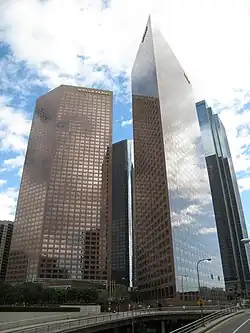Wells Fargo Center (Los Angeles)
Wells Fargo Center is a twin tower skyscraper complex in Downtown Los Angeles on Bunker Hill, in Los Angeles, California. It comprises South and North towers, which are joined by a three-story glass atrium.
| Wells Fargo Center | |
|---|---|
 Wells Fargo Tower (left), and KPMG Tower | |
| Alternative names | Crocker Center Crocker Center North & South Wells Fargo Center I & II IBM Tower |
| General information | |
| Type | Commercial offices |
| Location | 333 S. Grand Avenue Los Angeles, California |
| Coordinates | 34.0524°N 118.2522°W |
| Construction started | 1980-1981 |
| Completed | 1983 |
| Owner | Brookfield Properties Inc.[1] |
| Height | |
| Roof | Tower I: 220.37 m (723.0 ft) Tower II: 170.69 m (560.0 ft) |
| Technical details | |
| Floor count | Tower I: 54 Tower II: 45 |
| Floor area | Tower I: 1,391,000 sq ft (129,200 m2) Tower II: 1,140,000 sq ft (106,000 m2) |
| Lifts/elevators | Tower I: 29 Tower II: 26 |
| Design and construction | |
| Architect(s) | Skidmore, Owings & Merrill |
| Developer | Maguire Properties Thomas Properties Group |
| Structural engineer | Skidmore, Owings & Merrill |
| Main contractor | Turner Construction |
| References | |
| [2][3][4][5][6][7][8][9] | |
The project received the 1986–1987 and 2003–2004 Building Owners and Managers Association (BOMA) Office Building of the Year Award, and numerous others. A branch of the Wells Fargo History Museum is located at the center.[10]
Wells Fargo Tower
Wells Fargo Tower (Tower I), at 220 m (720 ft) it is the tallest building of the complex. It has 54 floors and it is the 8th tallest building in Los Angeles, and the 92nd-tallest building in the United States. When it opened in 1983, it was known as the Crocker Tower, named after San Francisco-based Crocker National Bank. Crocker merged with Wells Fargo in 1986.
During initial construction it was featured in the 1983 film, Blue Thunder. The top upper floors were not completed at the time of filming, so Roy Scheider's character shot a helicopter chasing him and the pilot ejects and drifts by the Crocker Center under construction and lands in the street. It was actually the base jumper Carl Boenish (1941–1984), off the Crocker Tower that performed the jump without permission on November 9, 1981, and it was front page news in the Los Angeles Times with photography from several angles.
- Anchor tenants
- Wells Fargo Bank (Floors 1,5,7,9,11,12)
- Payden & Rygel (Floors 31–32)
- Gibson, Dunn & Crutcher (Floors 44–54)
- Oaktree Capital Management (Floors 23–25, 27–30, 34)[11]
South Tower
South Tower (Tower II) is 171 m (561 ft), and was completed in 1983 with 45 floors. It is the 17th tallest building in the city.
- Anchor tenants
- Latham & Watkins (Floors 1–9)
- Reed Smith (Floors 28-29)
Fredric Jameson
Cultural critic Fredric Jameson used Skidmore, Owings and Merrill's Crocker Bank Center (as it was then named) as an example of what he sees as Postmodern architecture's "depthlessness":
Nor is this depthlessness merely metaphorical: it can be experienced physically and literally by anyone who, mounting what used to be Raymond Chandler's Beacon Hill from the great Chicano markets on Broadway and 4th St. in downtown Los Angeles, suddenly confronts the great free-standing wall of the Crocker Bank Center (Skidmore, Owings and Merrill) -- a surface which seems to be unsupported by any volume, or whose putative volume (rectangular, trapezoidal?) is ocularly quite undecidable. This great sheet of windows, with its gravity-defying two-dimensionality, momentarily transforms the solid ground on which we climb into the contents of a stereopticon, pasteboard shapes profiling themselves here and there around us. From all sides, the visual effect is the same: as fateful as the great monolith in Kubrick's 2001 which confronts its viewers like an enigmatic destiny, a call to evolutionary mutation. If this new multinational downtown ... effectively abolished the older ruined city fabric which it violently replaced, cannot something similar be said about the way in which this strange new surface in its own peremptory way renders our older systems of perception of the city somehow archaic and aimless, without offering another in their place?[12]
References
- Vincent, Roger (13 October 2013) "Brookfield becomes dominant landlord in L.A. financial district" Los Angeles Times
- "Wells Fargo Tower". CTBUH Skyscraper Center.
- "KPMG Tower". CTBUH Skyscraper Center.
- "Emporis building complex ID 102192". Emporis. Archived from the original on March 7, 2016.
- Wells Fargo Tower at Glass Steel and Stone (archived)
- KPMG Tower at Glass Steel and Stone (archived)
- "Wells Fargo Tower". SkyscraperPage.
- "KPMG Tower". SkyscraperPage.
- Wells Fargo Center at Structurae
- "Museums: Los Angeles". Wells Fargo History. Retrieved 24 February 2015.
- Vincent, Roger (November 14, 2014) "Oaktree Capital agrees to expand offices in downtown Los Angeles" Los Angeles Times
- Fredric Jameson, "Postmodernism, or The Culture of Late Capitalism", New Left Review, I/146, July–August 1984
Further reading
- Cameron, Robert (1990). Above Los Angeles. San Francisco: Cameron & Company. ISBN 0-918684-48-X.